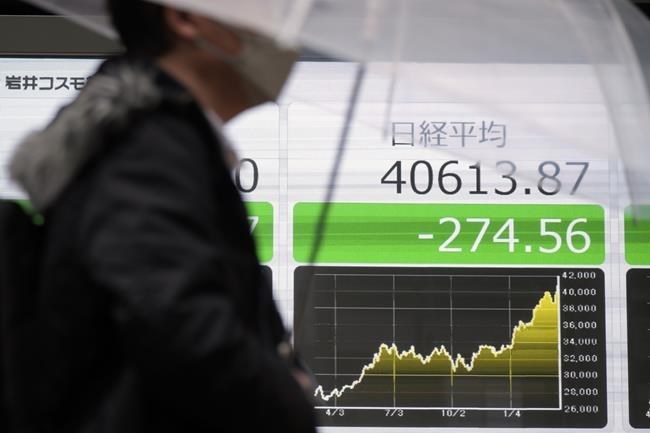NEW YORK (AP) — Stocks are ticking lower on Wall Street at the start of what will be a short trading week. The S&P 500 was down 0.2% in early trading Monday. The Dow Jones Industrial Average was off 73 points, and the Nasdaq composite was down 0.4%. The market is easing back from last week’s big run, which was its best of the year and sent all three indexes to records on Thursday. Boeing rose after announcing that its CEO will step down as part of a leadership shakeup at the embattled plane maker. U.S. markets will be closed in observance of Good Friday.
THIS IS A BREAKING NEWS UPDATE. AP’s earlier story follows below.
Wall Street drifted lower early Monday following last week's rally as investors awaited further indications as to when the Federal Reserve might begin cutting interest rates.
Futures for the S&P 500 fell 0.3% before the bell, while futures for the Dow Jones Industrial Average lost 0.2%.
Last week, Federal Reserve officials signaled that they still expect to cut their key interest rate three times in 2024, fueling a rally on Wall Street, despite signs that inflation remained elevated at the start of the year.
For now, central bank officials kept their benchmark rate unchanged for a fifth straight time.
Later this week, the government releases its consumer spending report, which includes a measure of inflation that is closely monitored by the Fed. On Tuesday, the Conference Board issues its consumer confidence report for March.
In corporate news early Monday, Boeing shares rose 4% after it announced that CEO Dave Calhoun was stepping down from the troubled aircraft maker at the end of 2024. A series of safety problems tied to manufacturing issues has drawn the attention of federal regulators, the most recent being a blown out panel of an Alaska Airlines jetliner in January.
Boeing, whose shares are down 25% so far this year, announced that its head of commercial airplanes was retiring and that its board chairman was also stepping down.
Shares of United Airlines tumbled 2.3% in premarket on news that federal regulators will increase their oversight of the Chicago carrier. The company made the announcement Friday following a series of recent issues including a piece of the outer fuselage falling off one jet, an engine fire and a plane losing a tire during takeoff.
Some companies on tap to report earnings this week are video game retailer GameStop, cruise ship operator Carnival and drugstore chain Walgreen's.
In Asia, Japan's Nikkei 225 shed 1.2% to finish at 40,414.12, as investors sold shares to lock in profits after the benchmark recently hit record highs.
Hong Kong’s Hang Seng declined 0.2% to 16,473.64, while the Shanghai Composite fell 0.7% to 3,026.31.
China's currency, the yuan, was set at a rate of 7.0996 against the U.S. dollar. The official “central parity rate,” is based on a weighted average of prices offered by market makers before the interbank market opens each business day. It is allowed to rise or fall only by 2% each trading day.
The yuan had weakened to more than 7.2282 to the dollar on Friday, falling to a four-month low, as the dollar gained against other currencies. Australia's S&P/ASX 200 rose 0.5% to 7,811.90. South Korea's Kospi lost 0.4% to 2,737.57.
A top Japanese finance official expressed reservations about the recent surge in the U.S. dollar against the Japanese yen, fueling speculation about possible intervention in the market. The dollar has risen to nearly 152 yen, a jump from slightly above 130 yen a year ago. It was trading at 151.29 yen on Monday, down from 151.41 yen. The euro cost $1.0831, up from $1.0810.
The Bank of Japan raised a key interest rate for the first time in 17 years last week, to barely above zero from below zero, or negative interest rates. That means borrowing rates in Japan still remain below those of the U.S. and many other nations.
“The recent Bank of Japan meeting added another layer of complexity to the dollar’s trajectory. Despite the BOJ’s decision to hike rates, cautious communication failed to stimulate demand for the Japanese yen,” said Luca Santos, currency analyst ACY Securities.
In Europe at midday, Germany’s DAX was virtually unchanged, while France’s CAC 40 slid 0.4%. Britain’s FTSE 100 lost 0.5%.
In energy trading, benchmark U.S. crude added 27 cents to $80.90 a barrel. Brent crude, the international standard, also rose 27 cents to $85.10 a barrel.
On Friday, the S&P 500 slipped 0.1% from an all-time high, while the Dow Jones Industrial Average fell 0.8%. The Nasdaq composite rose 0.2%, setting another record.
——
Yuri Kageyama And Matt Ott, The Associated Press
